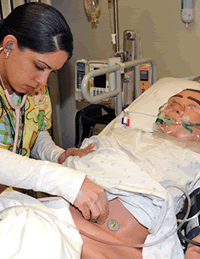Dayton VA Medical Center Surgical Service Simulation Center

The Surgical Service at the Veterans Affairs Medical Center (VAMC) in Dayton, Ohio is fortunate to have received funding from VISN 10 to develop a state of the art simulation center.
The center is equipped with:
- two anesthesia capable high-fidelity mannequins
- two wireless and portable physiologic mannequins
- two computerized trainers for pelvic examination
- computerized virtual reality trainers for
- laparoscopic surgery (with and without haptic feedback)
- GI endoscopy and bronchoscopy
- arthroscopy
- endovascular surgery and cardiac catheterization
The simulation center has internet-based audiovisual recording equipment, which allows for remote viewing of activities, training debriefing and analysis. Soon, additional equipment will be relocated from the medical center's affiliate, Wright State University Boonshoft School of Medicine.
The program also focuses on documentation, patient handoff reports and working with complex, high-tech equipment routinely used in critical care settings. Simulation is also being incorporated into unit-based competency assessment strategies.
In addition to the mannequin and task trainer strategies, Dayton VAMC is actively collaborating with the Wright State University College of Engineering in the area of virtual environments and process modeling. Major projects include the development of an interactive virtual patient with underlying neural nets and modeling of operating room utilization with upstream and downstream implications.
A grant from Women's Health is supporting the development of a simulation-based curriculum for primary care providers about common breast and gynecological conditions. The program will include virtual patient scenarios and pelvic training-based education.



















